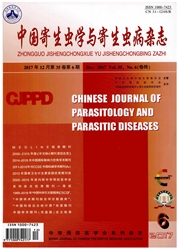

 中文摘要:
中文摘要:
目的观察日本血吸虫感染小鼠CD4^+CD25^+T细胞的免疫抑制功能及特征。方法日本血吸虫尾蚴(10±2条)感染BALB/c小鼠,在感染后6周(急性期,10只)和13周(慢性期,10只)取脾脏,制成脾单个核细胞,用免疫磁珠分选出CD4^+CD25^+T细胞。体外实验,将急性期和慢性期来源的CD4^+CD25^+T细胞与CD4^+CD25ˉT细胞共培养,^3H-TdR掺入法检测细胞增殖情况,ELISA检测细胞培养上清中的细胞因子。体内实验,将CD4^+CD25^+T细胞被动转移到日本血吸虫辐照致弱尾蚴免疫的小鼠体内,2周后剖杀取脾,用流式细胞仪检测脾组织中白细胞介素4+(IL-4+)、IL-10+和干扰素γ+(IFN-γ+)CD4^+T细胞比例,ELISA检测血清抗辐照致弱尾蚴抗原IgG1和IgG2a水平。结果体外实验显示,在血吸虫虫卵可溶性抗原(SEA)刺激下,与单纯CD4^+CD25ˉT细胞培养组(脉冲指数即cpm值为7615±1058)相比,CD4^+CD25^+T细胞对CD4^+CD25ˉT细胞增殖具明显的抑制作用(P〈0.01),并且感染慢性期来源的CD4^+CD25^+T细胞抑制作用(cpm值为2336±490)强于急性期来源的CD4^+CD25^+T细胞(cpm值为4467±144)(P〈0.05);并对IL-4、IFN-γ和IL-2等细胞因子分泌也具有抑制作用,其中急性期来源的CD4^+CD25^+T细胞对各细胞因子的抑制率分别为32.0%(P〈0.05)、66.3%(P〈0.01)和63.2%(P〈0.01);慢性期来源的CD4^+CD25^+T细胞对各细胞因子的抑制率分别为28.4%(P〈0.05)、60.1%(P〈0.01)和58.3%(P〈0.01)。体内实验显示,在辐照致弱尾蚴诱导的免疫应答中,转移慢性期血吸虫感染小鼠的CD4^+CD25^+T细胞对IFN-γ和IgG2a抗体的产生明显抑制作用(P〈0.05)。结论日本血吸虫感染诱导的CD4^+CD25^+T细胞具明显免疫抑制作用,并呈现优势抑制Th1应答的特征。
 英文摘要:
英文摘要:
Objective To investigate the suppressive effect of CD4^+CD25^+ regulatory T cells from mice infected with Schistosoma japonicum. Methods BALB/c mice were infected with S. japonicum. At 6 and 13 weeks post-infection, the spleens were removed and CD4^+CD25^+ T cells were separated by magnetic beads. In in vitro experiments, CD4^+CD25^+ T Cells were cocultured with CD4^+CD25ˉ T cells. The inhibitory role of the CD4^+CD25^+ T cells was assessed by [^3H] thymidine incorporation method and the cytokines in the cultural supernatant were detected by ELISA. In in vivo experiments, mice inoculated with irradiated cercariae of S. japonicum were adoptively transferred with CD4^+CD25^+T cells isolated from the mice chronically infected with S. japonicum. The intracellular cytokine expressions of splenocytes were performed by flow cytometry, and sera IgG1 and IgG2a antibodies against irradiated cercaria antigens were detected by ELISA. Results In vitro, CD4^+CD25^+T cells were able to suppress the proliferation of CD4^+CD25ˉT cells when stimulated with SEA, compared with single CD4^+CD25ˉT cells culture (cpm 7615±1 058) (P〈0.01). Furthermore, CD4^+CD25^+T cells isolated from mice chronically infected with S. japonicum presented higher suppressive efficacy (cpm 2 336±490), compared with that isolated from the acutely infected mice (cmp 4 467±144)(P〈0.05). Meanwhile, C D4^+CD25^+ T cells isolated from mice with the acute infection inhibited the cytokine secretion by CD4^+CD25^+T cells and the suppression rate was 32.0% for IL-4 (P〈0.05), 66.3% for IFN-γ (P〈0.01) and 63.2% for IL-2 (P〈0.01), respectively,and CD4^+CD25^+ T cells isolated from mice with the chronic infection, the suppression rate was 28.4% for IL-4 (P〈0.05), 60.1% for IFN-γ (P〈0.01) and 58.3% for IL-2 (P〈0.01), respectively. In vivo, IFN-γsecretion and IgG2a antibody production of mice adoptively transferred with CD4^+CD25^+ T cells from the chroni
 同期刊论文项目
同期刊论文项目
 同项目期刊论文
同项目期刊论文
 期刊信息
期刊信息
